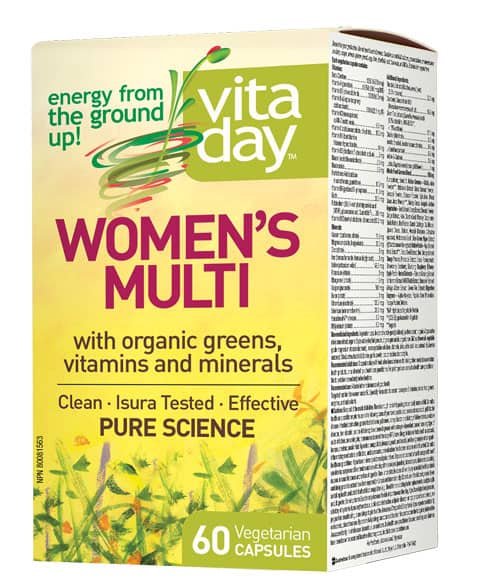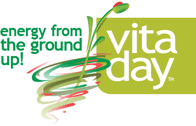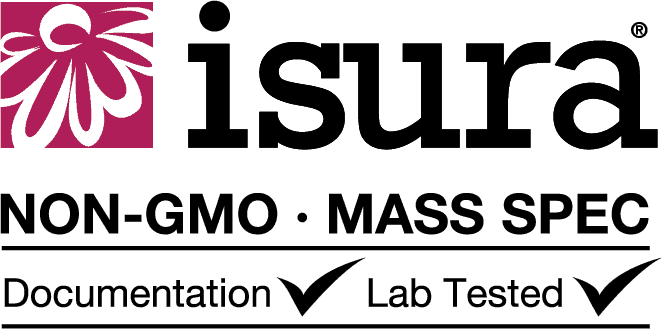Women’s | Women’s 50+ | Men’s | Men’s 50+ | Biotin | Prenatal Multi

Women’s Multi
with organic greens, vitamins, and minerals
- Includes coenzyme B vitamins and a whole food greens blend
- Easy to digest with a blend of digestive enzymes
- Contains rhodiola, cranberry, L-carnitine, and green tea
- Support for energy, immunity, and bone health
- Contains iron to prevent iron deficiency, anemia, and tiredness.
- Non-GMO verified by ISURA TM
- Contains organic ingredients
- Vegetarian friendly
![]()
VitaDay Women’s multi is a comprehensive daily multi-nutrient formula designed for the health and well-being of women under the age of 50. This formula features wholefood greens, coenzyme B vitamins, with herbal extracts such as cranberry concentrate, Rhodiola rosea, and green tea.
| Medicinal Ingredients | 1 vegetarian capsule | 3 vegetarian capsules |
|---|---|---|
| Vitamins | ||
| Beta-Carotene | 1250 IU (750 mcg) | 3750 IU (2250 mcg) |
| Vitamin A (palmitate) | 1655 IU (500 mcg RAE) | 4965 IU (1500 mcg RAE) |
| Vitamin D3 (cholecalciferol) | 332 IU (8.3 mcg) | 996 IU (24.9 mcg) |
| Vitamin E (d-alpha tocopheryl acid succinate) | 33 IU (22.3 mg AT) | 99 IU (66.9 AT) |
| Vitamin K2 (menaquinone) as MK-7 (natto bean) | 6.6 mcg | 19.8 mcg |
| Vitamin C (calcium ascorbate, dihydrate) | 83.3 mg | 249.9 mg |
| Vitamin B1 (benfotiamine, thiamine hydrochloride) | 14 mg | 42 mg |
| Vitamin B2 (riboflavin 5’-phosphate sodium) | 8 mg | 24 mg |
| Niacin (inositol hexanicotinate) | 6.6 mg | 19.8 mg |
| Niacinamide | 6.6 mg | 19.8 mg |
| Pantothenic Acid (calcium d-pantothenate, pantethine) | 16.6 mg | 49.8 mg |
| Vitamin B6 (pyridoxal 5’-phosphate) | 11.6 mg | 34.8 mg |
| Biotin | 33.3 mcg | 99.9 mcg |
| Folate (from (6S)-5-methyltetrahydrofolic acid (MTHF), glucosamine salt, Quatrefolic®) | 200 mcg | 600 mcg |
| Vitamin B12 (methylcobalamin, dibencozide) | 83.2 mcg | 249.6 mcg |
| Minerals | ||
| Calcium (carbonate, citrate) | 76.6 mg | 229.8 mcg |
| Magnesium (oxide, bisglycinate) | 33.3 mg | 99.9 mg |
| Zinc (citrate) | 5 mg | 15 mg |
| Iron (ferrous fumarate, ferrous bisglycinate) | 5 mg | 15 mg |
| Iodine (potassium iodide) | 166.6 mcg | 499.8 mcg |
| Potassium (citrate) | 5 mg | 15 mg |
| Manganese (citrate) | 1.6 mg | 4.8 mg |
| Copper (gluconate) | 500 mcg | 1500 mcg |
| Boron (citrate) | 1 mg | 3 mg |
| Chromium (nicotinate) | 133.3 mcg | 399.9 mcg |
| Selenium (selenomethionine) | 33.3 mcg | 99.9 mcg |
| Vanadium (HVP* chelate) | 8.3 mcg | 24.9 mcg |
| Molybdenum (citrate) | 8.3 mcg | 24.9 mcg |
| Additional Ingredients | ||
| Rhodiola Extract (Rhodiola rosea) (root) (3.5% rosavins) | 33.3 mg | 99.9 mg |
| Cranberry Concentrate 18:1 (Vaccinium macrocarpon) (fruit) | 16.6 mg | 49.8 mg |
| Green Tea Extract (Camellia sinensis) (leaf) (60% catechins, 40% EGCG**, < 15% caffeine |
17.1 mg | 51.3 mg |
| Choline (bitartrate) | 8.3 mg | 24.9 mg |
| Inositol (inositol, inositol hexanicotinate) | 9.9 mg | 29.7 mg |
| L-Carnitine (tartrate) | 6.6 mg | 19.8 mg |
| Indole-3-Carbinol | 1.6 mg | 4.8 mg |
| Lutein (Tagetes erecta) (marigold flower) | 1 mg | 3 mg |
| Whole Food Greens Blend | 100 mg | 300 mg |
A proprietary blend of:
Active Greens – Alfalfa Juice Powder***, Artichoke Extract, Black Currant Powder, Broccoli Powder, Spinach Powder, Spirulina, Wheat Grass Juice Powder***, Barley Grass, Arugula;
Active Vegetables – Beet Extract, Celery Extract, Tomato Powder, Ginger Extract, Kale, Cilantro Leaf, Parsley, Caperberry, Black Radish, Red Radish, Carrot, Cabbage, Cauliflower, Upland Cress, Daikon, Wasabi Rhizome (Wasabia japonica), Watercress Leaf, Blue-Green Algae Extract (Aphanizomenon flos-aquae);
Active Fruits – Açai Extract, Amla Extract***, Grape Seed Extract, Red Orange Extract, Mango Powder, Pineapple Extract, Grape, Pomegranate, Strawberry, Cranberry, Blueberry, Raspberry, Bilberry, Apple Pectin;
Herbal Extracts – Siberian Ginseng Extract, Schisandra Extract, Milk Thistle Extract, Dandelion Extract, Ginkgo biloba Extract, Green Tea Extract;
Digestive Enzymes – Alpha-Amylase, Papain, Stem Bromelain, Papaya Powder, Betaine.
*HVP: Hydrolyzed Vegetable Protein
**EGCG: Epigallocatechin-3-gallate
***organic
Non-medicinal ingredients: Vegetarian capsule (carbohydrate gum [cellulose], purified water), organic Oryza sativa (rice) bran extract, organic Oryza sativa (rice) hull powder, organic gum arabic, organic non-GMO sunflower oil, vegetable grade magnesium stearate (lubricant), microcrystalline cellulose, chlorella, silica, citric acid, kelp extract, Eucheuma seaweed, Stevia rebaudiana leaf, licorice, garlic powder, copper sodium chlorophyllin.
Recommended adult dose: 3 capsules daily with food, a few hours before or after taking other medications or natural health products, or as directed by a health care practitioner. For prolonged use, consult a health care practitioner.Not to be taken immediately before bedtime.
Contains no artificial colours, preservatives, or sweeteners; no dairy, sugar, wheat, gluten, yeast, egg, fish, shellfish, salt, tree nuts, or GMOs.
Research Information
Supplementation with vitamins, minerals and phytonutrients can have direct and indirect benefits for numerous bodily systems, including supporting normal antioxidant processes, detoxification, digestion as well as absorption of nutrients, circulation, protein synthesis, and immune function (1).
Vitamin C and zinc are essential for healing and immune function, and work alongside vitamin E and other nutrients to support skin health and antioxidant defences. Vitamin C is needed for the immune system and has been shown to reduce the number of colds in people under physical stress (2, 3).
Calcium, magnesium, and phosphorus are essential for the development and maintenance of bones and teeth, and vitamins D3 and K2 support the absorption and activity of these minerals (4, 5). Vitamin K2 is the most bioavailable, longest lasting, and most bioactive form of vitamin K and has been shown to promote bone health (6).
A 10-year population-based study evaluated 9,382 men and women over the age of 25. The study revealed a significant association between calcium and vitamin D supplementation, and improved bone mineral density. Participants taking vitamin D in doses greater than 400 IU per day had significantly higher bone mineral density in the hip region (7).
B vitamins are also essential for the synthesis of neurotransmitters including serotonin, and support the health of the nervous system, skin, mucous membranes, and red blood cell production (8). Several studies have associated B vitamin complexes with decreased feelings of workplace stress and strain (9).
B vitamins are also needed for the conversion of carbohydrates, fats, and proteins into energy, but for the body to use B vitamins effectively, they must be converted into their metabolically active coenzyme forms. Many people have genetic differences that impair this conversion process, but coenzymated B vitamins are metabolically active nutrients that the body can use directly.
Rhodiola rosea is an adaptogen that has been traditionally used in Russia and European countries to fight fatigue. Clinical trials have found that this herb supports energy and mental performance in people feeling “burnt out”. In one study, people experiencing stress who took 200 mg of Rhodiola twice a day for four weeks had a significant decrease in symptoms such as exhaustion, irritability, feelings of anxiousness, impaired concentration, and loss of zest for life (10).
Iron is a mineral that is critical to human health for its roll in the formation and proper function of red blood cells. This formula provides 15 mg of iron in the form of ferrous bisglycinate, an iron chelate that is gentler on the stomach and easier for the body to absorb than other forms of iron. Research shows that the body modulates the amount of iron absorbed from ferrous bisglycinate according to blood hemoglobin level, which may also make this a safer form of iron supplementation (11).
Cruciferous vegetables including broccoli, cabbage, and cauliflower, are a source of vitamins and minerals as well as polyphenols that support normal detoxification processes and estrogen metabolism. An analysis of 13 clinical studies found that regular consumption of cruciferous vegetables could help support breast tissue health (12, 13).
References
- Richelle, M., Sabatier, M., Steiling, H. & Williamson, G. (2006). Review Skin bioavailability of dietary vitamin E, carotenoids, polyphenols, vitamin C, zinc and selenium. Br J Nutr, 96(2), 227-38.
- Iqbal, K., Khan, A. & Khattak, M. (2004). Biological significance of ascorbic acid (vitamin C) in human health – A review. Pakistan Journal of Nutrition, 3(1), 5-13.
- Hemila, H. & Chalker, E. (2013). Vitamin C for preventing and treating the common cold. Cochrane Database Syst Rev, 1:CD000980.
- Chowdhury, R., Kunutsor, S., Vitezova, A., et al. (2014). Vitamin D and risk of cause specific death: systematic review and meta-analysis of observational cohort and randomized intervention studies. BMJ, 348:g1903.
- Patrick, R.P. & Ames, B.N. (2014). Vitamin D hormone regulates serotonin synthesis. Part 1: relevance for autism. The FASEB Journal, fj.13-246546.
- Knapen, M.H., Drummen, N.E., Smit, E., et al. (2013). Three-year low-dose menaquinone-7 supplementation helps decrease bone loss in healthy postmenopausal women. Osteoporos Int, 24(9), 2499-507.
- Zhou, W., Langsetmo, L., Berger, C., et al. (2013). Longitudinal changes in calcium and vitamin D intakes and relationship to bone mineral density in a prospective population-based study: the Canadian Multicentre Osteoporosis Study. Journal of Musculoskeletal Neuronal Interactions, 13(4), 470-479.
- McKevoy G.K., ed. (1998). AHFS Drug Information. Bethesda, MD: American Society of Health-System Pharmacists.
- Stough, C., Scholey, A., Lloyd, J., et al. (2011). The effect of 90-day administration of a high dose vitamin B-complex on work stress. Hum Psychopharmacol, 26(7), 470-6.
- Edwards, D., Heufelder, A. & Zimmermann, A. (2012). Therapeutic effects and safety of Rhodiola rosea extract WS® 1375 in subjects with life-stress symptoms – Results of an open-label study. Phytotherapy Research, 26, 1220-1225.
- Ashmead, H.D. (2001). The absorption and metabolism of iron amino acid chelate. Arch Latinoam Nutr, 51(1 Suppl 1):13-21.
- Liu, X. & Lv K. (2013). Cruciferous vegetables intake is inversely associated with risk of breast cancer: a meta-analysis. The Breast, 22(3), 309-313.
- Dwivedi, C., Heck, W.J., Downie, A.A., Larroya, S., Webb, T.E. (1990). Effect of calcium glucarate on B-glucuronidase activity and glucarate content on certain vegetables and fruits. Biochem Med Metab Bio, 43, 83-92.

